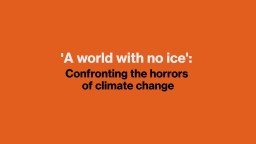A Better Planet: Forty Big Ideas for a Sustainable Future
DANIEL C. ESTY: The key to progress on environment broadly and on climate change in particular is to change values. I think this has to be understood as in some regards an ethical issue, a moral issue. And one has to see it as a wrong to contaminate the planet and to put at risk the future of humanity on the planet. And I think that change is coming and curiously but perhaps not really surprisingly it is coming from young people much more from the generation that's currently in positions of leadership. Greta and other young people are out there saying to the leaders in political positions of power not only in the United States but across the world: Step up, you need to do more. And I think we have seen again and again that transformational change is often driven by generational change. And I think it's almost certainly going to be true on climate change. Fifty years ago if we'd had this interview I'd probably be smoking or maybe smoking a pipe as a professor. That's so unacceptable now you don't even have to tell me that I can't come in and light up a cigarette.
Norms have changed. Values have changed. We know now that that's completely unacceptable and a threat to public health. And I think we're starting to get there on climate change. Things that might have in the past seemed normal, acceptable, even if they seemed a little bad, a little bit of harm are increasingly totally unacceptable. And we therefore have I think the foundation for the kind of generational change and change in values that can really drive us more quickly towards climate change solutions.
In our Better Planet book there's a really beautiful essay by one of the students at Yale, one of several student essays in this case by a guy named Paul Rink spelling out how young people in particular are starting to drive some of these court cases where they take on both the government and the big energy industry companies and say it's up to you to make our future secure and you're not doing the job you need to do.
And I do think that that risk that there will be a change in society's values and that the court system, the judges, the legal community will begin to say to the energy world you do have some responsibility here. You're not protected from liability and that prospect might get the energy companies to become part of the solution as opposed to leading the problem. If you want to ask me about the best path forward it would be to get those energy companies to transform the vision of themselves from being oil companies or worse yet coal companies and to really think of themselves as leaders of a path to a clean energy future. And I think there is evidence that people have done that in the past in other arenas, and I think it could be done here.





